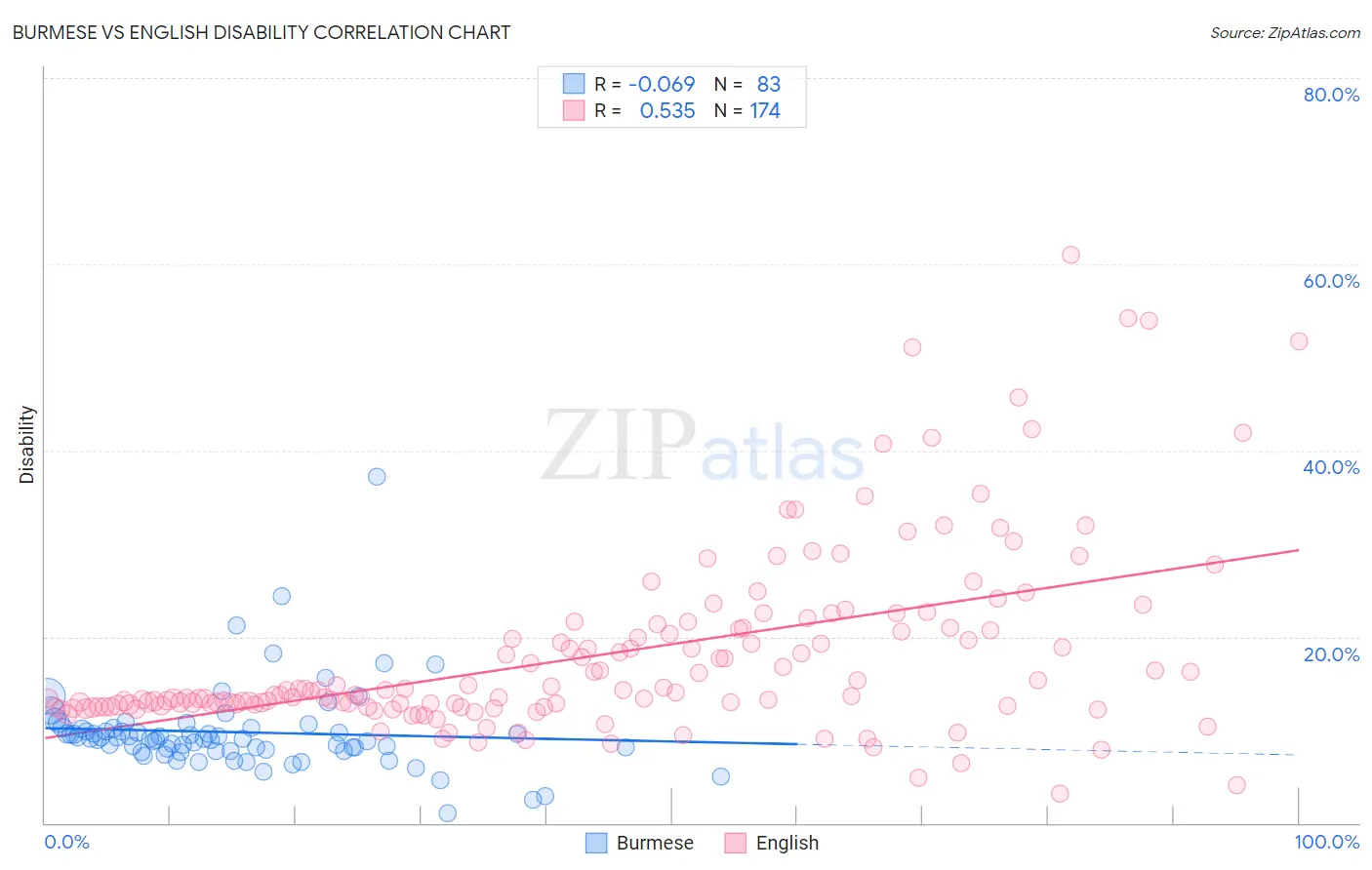Burmese vs English Disability
COMPARE
Burmese
English
Disability
Disability Comparison
Burmese
English
10.4%
DISABILITY
100.0/ 100
METRIC RATING
18th/ 347
METRIC RANK
13.0%
DISABILITY
0.0/ 100
METRIC RATING
286th/ 347
METRIC RANK
Burmese vs English Disability Correlation Chart
The statistical analysis conducted on geographies consisting of 465,330,582 people shows a slight negative correlation between the proportion of Burmese and percentage of population with a disability in the United States with a correlation coefficient (R) of -0.069 and weighted average of 10.4%. Similarly, the statistical analysis conducted on geographies consisting of 579,766,165 people shows a substantial positive correlation between the proportion of English and percentage of population with a disability in the United States with a correlation coefficient (R) of 0.535 and weighted average of 13.0%, a difference of 25.0%.

Disability Correlation Summary
| Measurement | Burmese | English |
| Minimum | 1.1% | 3.2% |
| Maximum | 37.1% | 61.0% |
| Range | 36.1% | 57.9% |
| Mean | 9.7% | 18.0% |
| Median | 9.0% | 13.7% |
| Interquartile 25% (IQ1) | 7.7% | 12.6% |
| Interquartile 75% (IQ3) | 10.2% | 20.9% |
| Interquartile Range (IQR) | 2.4% | 8.3% |
| Standard Deviation (Sample) | 4.7% | 9.9% |
| Standard Deviation (Population) | 4.6% | 9.9% |
Similar Demographics by Disability
Demographics Similar to Burmese by Disability
In terms of disability, the demographic groups most similar to Burmese are Immigrants from Pakistan (10.4%, a difference of 0.010%), Immigrants from Venezuela (10.4%, a difference of 0.70%), Asian (10.4%, a difference of 0.72%), Immigrants from Sri Lanka (10.5%, a difference of 0.83%), and Immigrants from Iran (10.3%, a difference of 0.99%).
| Demographics | Rating | Rank | Disability |
| Iranians | 100.0 /100 | #11 | Exceptional 10.1% |
| Immigrants | Israel | 100.0 /100 | #12 | Exceptional 10.1% |
| Immigrants | Eastern Asia | 100.0 /100 | #13 | Exceptional 10.2% |
| Immigrants | Korea | 100.0 /100 | #14 | Exceptional 10.2% |
| Okinawans | 100.0 /100 | #15 | Exceptional 10.3% |
| Indians (Asian) | 100.0 /100 | #16 | Exceptional 10.3% |
| Immigrants | Iran | 100.0 /100 | #17 | Exceptional 10.3% |
| Burmese | 100.0 /100 | #18 | Exceptional 10.4% |
| Immigrants | Pakistan | 100.0 /100 | #19 | Exceptional 10.4% |
| Immigrants | Venezuela | 100.0 /100 | #20 | Exceptional 10.4% |
| Asians | 100.0 /100 | #21 | Exceptional 10.4% |
| Immigrants | Sri Lanka | 100.0 /100 | #22 | Exceptional 10.5% |
| Immigrants | Asia | 100.0 /100 | #23 | Exceptional 10.5% |
| Venezuelans | 100.0 /100 | #24 | Exceptional 10.5% |
| Immigrants | Malaysia | 100.0 /100 | #25 | Exceptional 10.6% |
Demographics Similar to English by Disability
In terms of disability, the demographic groups most similar to English are Crow (12.9%, a difference of 0.38%), Welsh (12.9%, a difference of 0.39%), African (13.0%, a difference of 0.41%), White/Caucasian (13.0%, a difference of 0.43%), and Slovak (13.0%, a difference of 0.44%).
| Demographics | Rating | Rank | Disability |
| Fijians | 0.0 /100 | #279 | Tragic 12.8% |
| Spanish | 0.0 /100 | #280 | Tragic 12.8% |
| Immigrants | Portugal | 0.0 /100 | #281 | Tragic 12.9% |
| Scottish | 0.0 /100 | #282 | Tragic 12.9% |
| Irish | 0.0 /100 | #283 | Tragic 12.9% |
| Welsh | 0.0 /100 | #284 | Tragic 12.9% |
| Crow | 0.0 /100 | #285 | Tragic 12.9% |
| English | 0.0 /100 | #286 | Tragic 13.0% |
| Africans | 0.0 /100 | #287 | Tragic 13.0% |
| Whites/Caucasians | 0.0 /100 | #288 | Tragic 13.0% |
| Slovaks | 0.0 /100 | #289 | Tragic 13.0% |
| Cheyenne | 0.0 /100 | #290 | Tragic 13.0% |
| Yaqui | 0.0 /100 | #291 | Tragic 13.1% |
| Aleuts | 0.0 /100 | #292 | Tragic 13.1% |
| Marshallese | 0.0 /100 | #293 | Tragic 13.1% |